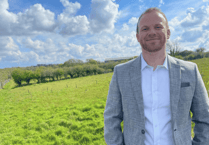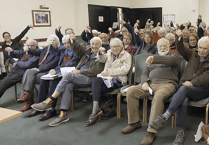St Austell Chamber of Commerce has expressed dismay that the commercial aspect of the Trewhiddle Farm planning application has been dropped in favour of more housing.
Chairman Dave Halton said he was “very disappointed” to see the current planning application (PA23/09281) propose 150 homes on land that was previously approved for a variety of commercial usages, including 110,000 square foot of retail, 600 full-time direct and indirect jobs, a pub/restaurant, a small food store and a 60-bed hotel.
Casting his mind to back to 2014/2015, Mr Halton said: “On several occasions, the much-talked about Trewhiddle Farm planning application and scheme was presented to the St Austell Chamber of Commerce. Developer Kingsley Homes wanted to show its hopes and ambitions for the area, to gain ‘stakeholder’ support.
“Many people at the time were not supportive of the scheme, as they felt giving up the large amount of green fields was too much of an ask, coupled with the already very stretched public services of the area. But due to the commercial elements of it, they changed their minds and offered support.
“With their recent planning application (PA23/09281), it would appear that all the commercial aspect of this scheme is now being dropped and instead, another 150 homes added to the original 460 houses to make 610.
“As you can now quite imagine, St Austell Chamber of Commerce is very disappointed to see there is a different approach. We would not have offered stakeholder support if the scheme did not carry the large commercial element.”
Mr Halton continued: “Without doubt, we’re in challenging economic times and trying to encourage businesses to agree a new leases etc for retail, hotels and food stores is hard. In the future though, it will be different, or a rethink on the commercial offering might help.
“There is absolute outcry from the general public that yet more houses will be built. Most comment on the fact that St Austell’s infrastructure and public services are already past bursting point. Before more houses are built, we desperately need more doctors, hospitals, dentists, teachers, public transport … the list goes on and on.”





This article has no comments yet. Be the first to leave a comment.